
Fighting Asian hornets in Crésuz
Have you discovered an Asian hornet's nest? We'll be on site quickly! Call now - Daily Mon-Sun 07:00-21:30. Contact us now: 058 510 22 54
Having the Asian hornet's nest removed
The invasive expansion of Vespa velutina, a hornet species from South-East Asia, has successfully reached Switzerland and the entire subcontinent. Despite its peaceful nature towards humans, it has gained notoriety as a formidable predator of honey bees, inciting alarm among beekeepers. In just a few hours, a few of these hornets can execute a devastating assault that wipes out an entire bee colony. If you have discovered a hornet's nest on your house, patio, shed, or in your blind box, contact our experts for hornet nest removal in Crésuz!
Use the uncomplicated telephone service of the Hornet experts in Crésuz and simply inform us at 058 510 22 54, we will be on site quickly so that you and everyone in your area feel completely safe again.
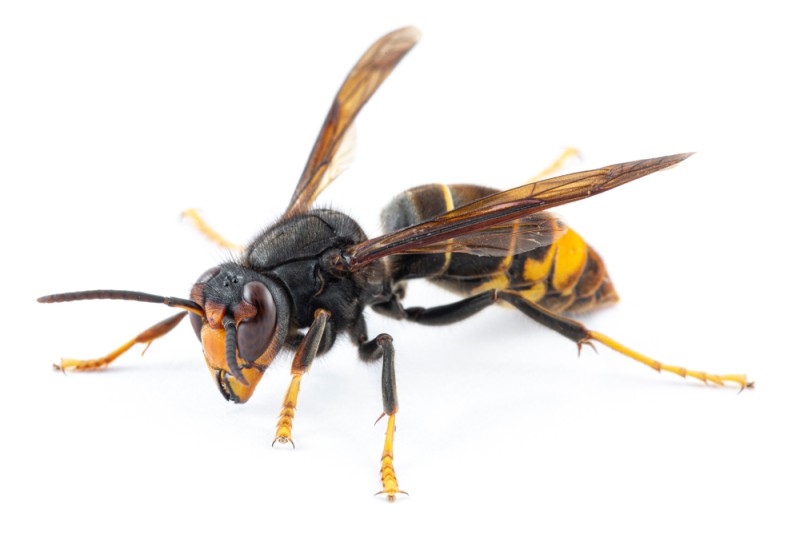

Appearance of the Asian hornet
Here are some characteristics that distinguish the Asian hornet:
1. Size: The queen can reach a length of about 3 cm, while the workers are slightly smaller and measure about 2.5 cm.
2. Color: The Asian hornet has a dark body that is almost black, with a yellow stripe at the back of the abdomen. Its face is orange-yellow.
3. Wings: The wings are dark and almost smoky gray.
4. Legs: The hornet has yellow tips on its legs, which is a striking distinguishing feature when it flies.
5. Nest: The Asian hornet's nest is often high in the trees, but it can also be found underground or in tall structures such as chimneys. It has an oval shape and is made of chewed wood, which gives the hornet a papery texture.
It is important to distinguish the Asian hornet from the European hornet (Vespa crabro), which is more harmless and a natural part of the European fauna. If you suspect you have found an Asian hornet nest near you in Crésuz, you should report this to the local authorities, or using our reporting form, as they can spread quickly and be harmful to bees and other insects. To avoid being attacked by the flying inhabitants, you should hire a professional pest controller such as the Hornet Experts Crésuz. We can identify the nest beyond doubt and take further steps to remove the Asian hornets professionally.
News about the Asian hornet in Crésuz
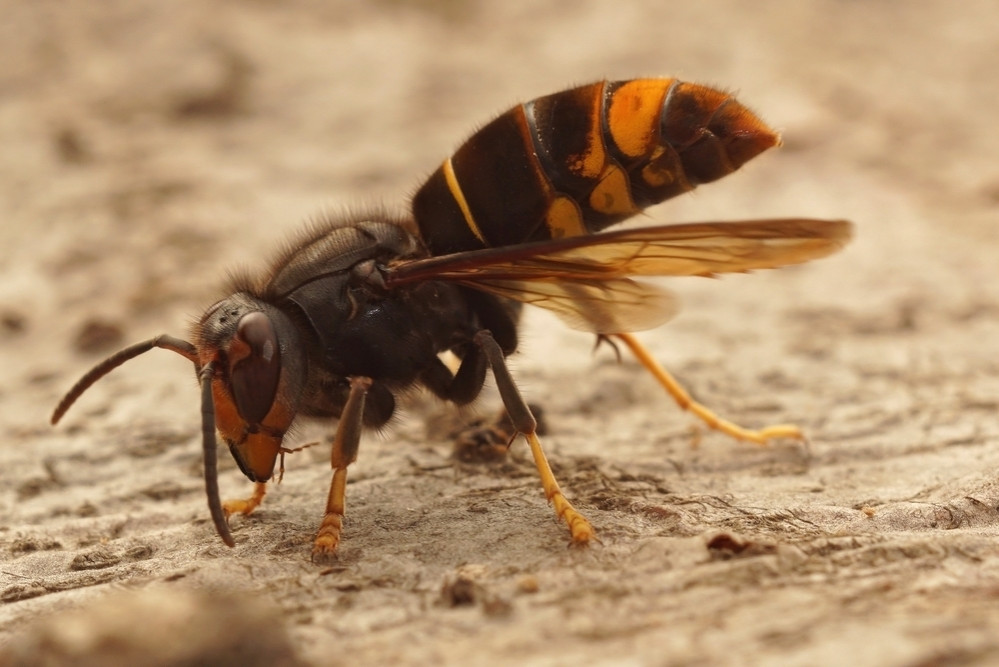
02.12.2025 Western Switzerland: Killer hornet eats bees
The territory of the Asian killer hornet has expanded considerably this year, with a notable increase reported in western Switzerland. This invasive species poses a significant threat to native bee populations, as bees make up the majority of its diet. The potential consequences are serious. Moreover, the hornet represents a danger to individuals with allergies to its venom.
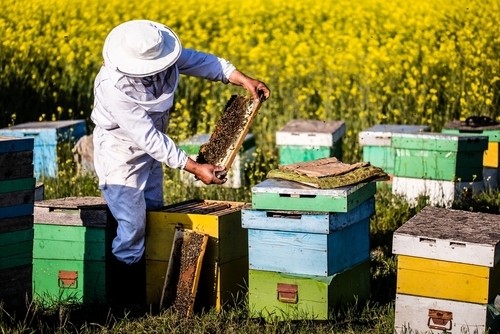
25.11.2025 Serious concerns about the bee population!
Asian hornets are inflicting significant harm on beehives across multiple parts of Europe, as reported by local beekeepers. Even a small number of hornets can destroy an entire bee colony within hours. This sharp decline in pollinators could have serious consequences for pollination, local ecosystems, and agricultural productivity.
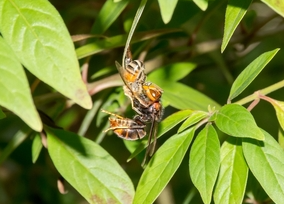
18.11.2025 Asian hornet doesn't just eat bees!
The danger it presents to insects is substantial!
The Asian hornet feeds largely on honeybees—up to 85 percent of its diet—alongside beetles and flies. This high level of predation not only poses difficulties for fruit growers but also further threatens already vulnerable bee populations.
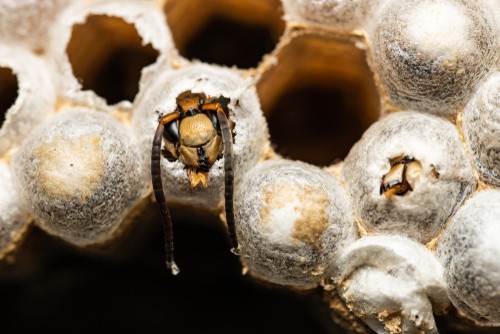
11.11.2025 How did the Asian hornet get to Europe?
The Asian hornet likely arrived in Europe unintentionally and has quickly expanded throughout France and nearby countries. Its adaptability to different environments and the absence of natural predators have contributed to its rapid spread. A single nest can generate several hundred new queens in one breeding season.
Asian Hornet Reporting Form
Please fill out all required fields and submit the form.
Help us!
If you discover an Asian hornet or a nest of this invasive species in Crésuz, it is of the utmost importance that you report it immediately. The Asian hornet is not only dangerous to humans, but also poses a serious threat to native bee populations and the ecological balance in Switzerland.
Why is it important to report the find?
When the Asian hornet becomes established in a region, it has a significant impact on native insects, with honey bees being particularly affected. By preying on bees, these hornets contribute to a decline in pollinator populations, ultimately affecting the local flora and agricultural yield. By reporting sightings, experts can react quickly, remove the hornets or their nests and thus prevent the spread of this invasive species.
Notification form for sightings
Mitigating the Asian hornet overpopulation in Switzerland and protecting our native insect populations are key to maintaining ecological balance. We encourage you to report any suspicions or sightings using our specialized reporting form. With your active participation, we can intervene at an early stage and minimize the propagation of this dangerous species.
Your contribution is crucial in the fight against the Asian hornet in Crésuz. Together we can protect nature and maintain the balance of our ecosystems;
Thank you for your vigilant attention and your commitment to protecting our environment.
How dangerous is the Asian hornet?
The Asian hornet (Vespa velutina) is a predatory insect that originated in Asia and has spread in recent years to various parts of Europe, including France and now also Switzerland and in Crésuz. Although it poses a threat to honey bees and native biodiversity, it is generally no more dangerous to humans than other wasp species. Nevertheless, there are some aspects to be aware of:
1. Threat to honey bees: The Asian hornet preys on honey bees, threatening native bee populations. A decline in bees can have a negative impact on pollination and thus on local flora and agricultural production.
2. Stings: As with other wasp and hornet species, the stings of the Asian hornet can also be painful. For most people, the stings are unpleasant but not dangerous. However, people who are allergic to wasp or hornet stings can suffer a severe allergic reaction, which in the worst case can lead to anaphylactic shock.
3. Aggressiveness: Although the Asian hornet is not necessarily more aggressive towards humans than other wasp species, it can become aggressive if it feels threatened, especially near its nest.
4. Ecological effects: Apart from the direct effects on honey bees, the spread of the Asian hornet can also disturb the ecological balance by affecting the populations of other insects.
Please be aware that distinguishing between the Asian hornet and the Asian giant hornet (*Vespa mandarinia*) is of utmost importance. The giant hornet, often known as the "killer hornet", is considerably larger and may present a higher risk to humans due to its more potent venom and the size of its sting.
If you have discovered a nest, call us immediately: 058 510 22 54
Our hornet professionals in Crésuz are certified by the VSS.
Frequently Asked Questions About Asian Hornets in Crésuz
The Asian hornet is characterized by its ability to deliver stings that can be potentially serious or even fatal—making it significantly more dangerous than most other hornet species.
Boasting a robust build and growing up to 3 cm in length, the Asian hornet is a notable stinging insect. Its elongated, jet-black body is adorned with a charming pattern of vibrant orange, yellow, and black stripes.
Humans should be wary of the Asian hornet's poisonous effects. Its bite can deliver significant pain and potentially induce allergic reactions.
The Asian hornet poses a significant risk to humans due to its venomous sting, which can inflict intense pain and potentially induce allergic reactions.
Caution is advised around the Asian hornet due to its venomous sting, surpassing the pain inflicted by other wasps. Moreover, it has the potential to cause allergic reactions.
Reporting an Asian hornet sighting entails contacting a regional officer trained in safeguarding wild bees or liaising with the appropriate department within the Ministry of Agriculture entrusted with overseeing these activities.
Timely reporting of Asian hornets plays a critical role in preventing attacks and impeding the spread of this insect. The pronounced territoriality and aggression of these hornets highlight the need for proactive reporting.
In the case of Asian hornets in Switzerland, professional hornet control is essential to handle the situation. To accomplish this, it is advisable to contact a reliable pest control service for appropriate assistance.
The Asian hornet is not afforded protected status. Hence, it is vital to exercise constant vigilance and monitor their population to prevent their proliferation.
When entering hibernation, the Asian hornet adopts either a collective hibernation strategy, where they hibernate together, or a solitary hibernation approach, settling in the corners of walls, buildings, garden sheds, incidental structures, or tree hollows.
Would you like more information about Asian hornets? Then take a look at our FAQ's about Asian hornets.
Private inquiry form
For an uncomplicated request to remove an Asian hornet's nest, please use our contact form for private individuals.
Real estate inquiry form
Use our property management order form to request the removal of an Asian hornet's nest.




_3.jpeg)
_3.jpeg)
_3.jpeg)
_3.jpeg)